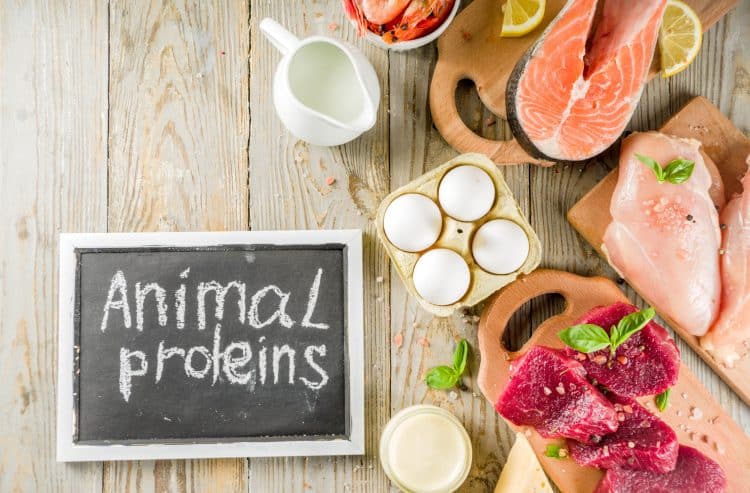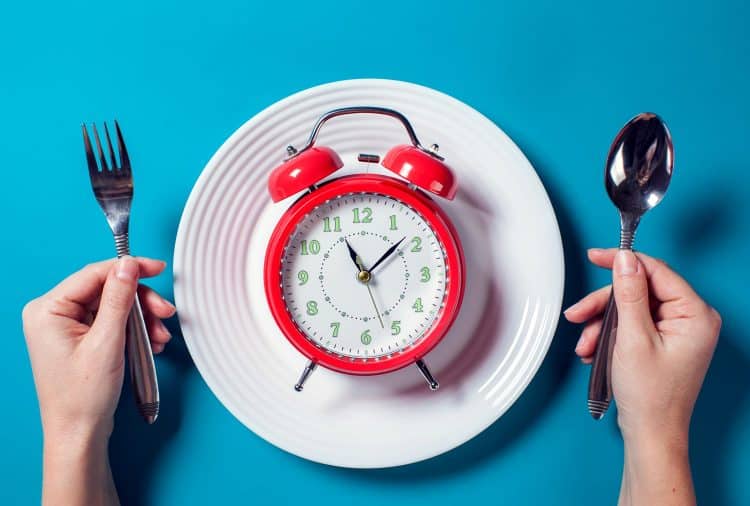As people age, it becomes tough for them to maintain a healthy weight and a slender body. This is especially true for women over 50 experiencing menopause. During menopause, they encounter a sudden dip in estrogen levels and other hormonal imbalances that lead to increased abdominal fat, mood swings, rapid muscle loss, osteoporosis, a slow metabolism, sleep disturbances, depression, anxiety, and stress.[1]
Insulin resistance and loss of body and bone mass are the root causes of various health issues associated with aging in women over 50. Plus, a sedentary lifestyle is a major contributor to weight gain in women over 50.
In such a scenario, maintaining a healthy lifestyle that includes eating nutritious food, sleeping well, being active, and managing stress is essential to combating age-related issues. Time-restricted feeding or intermittent fasting has been shown to benefit seniors by improving insulin resistance and reducing body weight and inflammation.[2]
In this article, we will delve more deeply into what intermittent fasting is, its benefits, and how it works to retain muscle mass, improve metabolism, and keep weight in check in women over 50.
What is Intermittent Fasting?
Intermittent fasting involves cycling between voluntary fasting and non-fasting over a given period. However, it does not focus on restricting calories; rather, it emphasizes how much time you abstain from eating. It encourages eating only in a specific time window, and you consume no calories for the rest of the day.
Level Up Your Fitness: Join our 💪 strong community in Fitness Volt Newsletter. Get daily inspiration, expert-backed workouts, nutrition tips, the latest in strength sports, and the support you need to reach your goals. Subscribe for free!
However, keeping yourself hydrated during the fasting period is crucial. So you must drink water and zero-calorie beverages like black coffee or tea (of course, without sugar or cream) throughout the fasting period.
You can eat normally at the end of the fasting window. A balanced diet consisting of healthful foods is always encouraged. It is recommended for women over 50 to eat a balanced diet, as it helps boost your metabolism, reduces insulin resistance, and alleviates other hormonal issues.
However, you must keep yourself away from inflammatory foods such as sugary and carbonated drinks, refined sugar and grains, fried food, processed meat, etc., as these can exacerbate the adverse effects of menopause, such as hot flashes.
There are several types of intermittent fasting, of which some of the most popular are:
- Time-restricted eating (TRE): It involves alternating between periods of restricting calories and eating normally.[3] An example of TRE is the 16/8 method, which includes calorie restriction for 16 consecutive hours and consuming food within the rest of the eight-hour window. It is a popular method as it is the most doable and least restrictive, which can suit the schedule of most people.
- The 5:2 method: This method includes eating normally for five days and restricting your calorie intake to 500 calories for two non-consecutive days of the week.
- Alternate day fasting: It involves fasting on every alternate day and eating. However, you can consume a maximum of 500 calories on fasting days. Research says this method is beneficial for shedding weight, improving heart conditions, and lowering oxidative stress and inflammation.[4]
Benefits of Intermittent Fasting For Women Over 50
According to research, intermittent fasting can benefit women over 50 in various ways, including:
- Improved metabolic and heart health [5][6]
- Better weight loss [7]
- Type 2 diabetes management [8]
- Increased insulin sensitivity [9]
- Preventing metabolic syndrome, which generally leads to neurological disorders [10]
- Enhanced circadian rhythm [11]
- Improved conditions such as anxiety, depression, and insomnia [12]
- Improved fitness levels and athletic performance [13]
- Reduced inflammation and improved liver and gut health [14][15][16][17]
- Enhanced cognitive function [18]
Does Intermittent Fasting Work for Women over 50?
Yes, it does. Intermittent fasting has shown promising results in both premenopausal and postmenopausal women. A 2020 study indicated that intermittent fasting reduces fat mass, insulin levels, insulin resistance, and blood pressure, regardless of sex or menopausal status. It also reduces LDL cholesterol levels, a potential risk factor for heart disease in post-menopausal women [19].
Another study revealed that time-restricted feeding, or TRF, is beneficial in reducing fasting insulin, insulin resistance, fat mass, and oxidative stress in both pre and postmenopausal women. It also helps improve their metabolism. [5]
Since estrogen levels in women over 50 decline naturally, pre and postmenopausal women are at a higher risk of gaining weight, developing cardiovascular disease, and having problems with blood sugar regulation. Intermittent fasting helps alleviate these issues. [20]
Intermittent Fasting and Diet Quality
Although intermittent fasting is beneficial for overall metabolic health, you should exercise caution while choosing your food. Additionally, you must carefully watch your activity schedule, sleep quality, and stress management.
Your diet must include whole foods such as grains, legumes, vegetables, and fruits. Since women over 50 are at a greater risk of losing muscle mass and developing fat mass, your diet should also have enough protein (Paleo or Mediterranean diets are good options).
As people grow older, they naturally lose muscle mass. This problem increases if you don’t remain physically active or do not consume enough protein in your diet. Losing muscle mass causes metabolic dysfunction and fat gain.
Since intermittent fasting involves calorie restriction, it may lead to a lower protein intake. If women over 50 do not consume their goal protein within the eating window, they may lose muscle mass. Thus, you must carry out strength training and optimize your protein consumption to overcome this issue.
How Much Protein Do You Require?

The recommended dietary allowance (RDA) for protein is 0.8 grams per kilogram of body weight to maximize muscle health. However, your body does not efficiently use dietary protein as you age. Hence, you need more protein to maintain muscle health. [21]
Experts recommend elderly adults consume 1.2 to 2 grams of protein per kilogram of body weight daily. [22]
Level Up Your Fitness: Join our 💪 strong community in Fitness Volt Newsletter. Get daily inspiration, expert-backed workouts, nutrition tips, the latest in strength sports, and the support you need to reach your goals. Subscribe for free!
For example, if you are over 50 and weigh 55 kilograms (121.25 pounds), you must consume at least 66 to 110 grams of protein daily, or possibly more.
Optimizing Protein Intake When Fasting
Women over 50 that are intermittent fasting are more likely to fall short of their protein intake goal than women eating a normal diet. In such a scenario, you may maintain your muscle mass by engaging in strength training and optimizing your dietary protein intake.
Here is a list of some protein-rich foods and the amount of protein per serving.[23]
| Protein Source | Serving Size | Amount of Protein (gm) |
| Whey protein | 3 scoops | 50 |
| Chicken gizzard | 1.0 cup chopped or diced | 44 |
| Yellowtail fish | 0.5 fillets | 43 |
| Black beans | 1 cup | 42 |
| Chicken breast | 3 ounces | 28 |
| Turkey breast | 3 ounces | 25 |
| Pork | 3 ounces | 23 |
| Salmon | 3 ounces | 22 |
| Tuna | 3 ounces | 22 |
| Shrimp | 3 ounces | 20 |
| Greek yogurt | 6 ounces | 18 |
| Cottage cheese | 4 ounces | 14 |
| Soy nuts | 1 ounce | 12 |
| Lentils | ½ cup | 9 |
| Pumpkin seeds | 1 ounce | 9 |
| Milk | 1 cup | 8 |
| Soy milk | 1 cup | 8 |
| Almonds | 1 ounce | 7 |
| Egg | 1 large | 6 |
| Quinoa | ½ cup | 4 |
| Chia seeds | 1 ounce | 5 |
It is evident from the above list that animal-based foods are packed with protein. But that does not mean you should only consume animal proteins. You must incorporate various foods into your diet to reach your protein target.
Is Intermittent Fasting Right For You?
Intermittent fasting not only benefits overweight people or folks with metabolic disorders, but it also benefits people who are of normal weight and are healthy. When you consider intermittent fasting, you must know whether it is right for you.
Intermittent fasting is good for you if you:
- Feel good when eating a restricted diet
- Don’t have a negative relationship with food
- You feel better when you do short-term liquid-only fast
Intermittent fasting is not for you if you:
- Feel dizzy, exhausted, irritable, and hungry upon skipping a meal
- Always are constantly hungry
- Feel uncomfortable during a fast
Fasting Tips for Women Over 50
Women over 50 can follow the following fasting tips when considering intermittent fasting.
Start Small
If you are new to intermittent fasting, keeping the fasting windows short is always recommended. You can start with overnight fasting, which is fasting from dinner to breakfast. If you feel comfortable with it, then increase your fasting hours gradually.
Don’t Restrict Your Calories Too Much
Intermittent fasting allows you to consume the required calories within the eating window. But most people restrict themselves and end up in a calorie deficit. Cutting down too many calories can impair your metabolism, and you will begin to lose muscle mass instead of gaining it. Your blood pressure may rapidly decrease, and you may encounter an electrolyte imbalance. Instead, you can maintain a minor calorie deficit to avoid these issues and obtain better results.
Prioritize Your Protein Intake
Insufficient protein can lead to sarcopenia, which is age-induced muscle loss. Insufficient protein can also impair your immunity and make you fall ill very often. It may also decrease your overall strength.
Focus on Strength Training
Complement intermittent fasting with strength training. It can help you retain muscle mass and strength.[24]
Retaining muscle mass as we age is difficult, eventually resulting in muscle loss and weight gain. However, regular strength training exercises and consuming sufficient protein can help overcome this issue.
Keep a Check on Electrolyte Imbalances
Extended intermittent fasting can lead to electrolyte imbalances by drastically dropping your sodium and potassium levels. This can lead to muscle cramps, headaches, and fatigue. Drinking electrolyte water, coconut water, and eating electrolyte-rich foods such as spinach can boost your electrolyte levels.
Always Focus on a Nutrient-Dense Diet
Although intermittent fasting focuses on when to eat only, what to eat is equally crucial to sustain fasting in the long run and maintain good health. Your diet should comprise whole grains, complex carbs, lean proteins, healthy fats, and enough fiber. Additionally, your water intake should also be intact. Eating a healthy and balanced diet can help combat many chronic diseases and keep you healthy. Skipping refined, deep-fried, excessively salty, sugary, and packed foods is highly recommended.
Frequently Asked Questions
1. How many hours should a woman over 50 do intermittent fasting?
If you are new to intermittent fasting, keeping the duration of fasting short is always recommended. You can start with an overnight fast of 12 hours. This refers to fasting from dinner to breakfast. If you feel comfortable with it, then increase your fasting hours gradually.
2. Is intermittent fasting safe for women over 50?
According to research, intermittent fasting is safe for women over 50 [25]. However, you must consult your healthcare provider if you encounter conditions like hypoglycemia, dizziness, weakness, fatigue, or muscle loss.
3. What is the best intermittent fasting method for menopausal women?
16:8 Intermittent fasting is believed to be the most convenient method for menopausal women, as it is much more flexible to follow.
Bottom Line
Women over 50 undergo several bodily changes, such as weight gain, increased blood glucose levels, insulin resistance, rapid muscle loss, a slow metabolism, mood swings, anxiety, etc., during menopause. These occur due to the decrease in estrogen levels and hormonal imbalances.
Although research is limited, some studies indicate that intermittent fasting can benefit women over 50 with weight loss, reduced insulin resistance, blood glucose, and LDL cholesterol. It may improve heart and metabolic health as well. Before starting any intermittent fasting plan, consult your healthcare provider, especially if you have any pre-existing health conditions.
References
- Peacock, K., & Ketvertis, K. M. (2022, August 11). Menopause – StatPearls – NCBI Bookshelf. Menopause – StatPearls – NCBI Bookshelf. https://www.ncbi.nlm.nih.gov/books/NBK507826/
- Lin, S., Oliveira, M. L., Gabel, K., Kalam, F., Cienfuegos, S., Ezpeleta, M., Bhutani, S., & Varady, K. A. (2020, October 31). Does the weight loss efficacy of alternate-day fasting differ according to sex and menopausal status? PubMed Central (PMC). https://doi.org/10.1016/j.numecd.2020.10.018
- Soliman, G. A. (2022, October 28). Intermittent fasting and time-restricted eating role in dietary interventions and precision nutrition. PubMed Central (PMC). https://doi.org/10.3389/fpubh.2022.1017254
- Johnson, J. B., Summer, W., Cutler, R. G., Martin, B., Hyun, D. H., Dixit, V. D., Pearson, M., Nassar, M., Maudsley, S., Carlson, O., John, S., Laub, D. R., & Mattson, M. P. (2006, December 14). Alternate Day Calorie Restriction Improves Clinical Findings and Reduces Markers of Oxidative Stress and Inflammation in Overweight Adults with Moderate Asthma. PubMed Central (PMC). https://doi.org/10.1016/j.freeradbiomed.2006.12.005
- Changes in body weight and metabolic risk during time-restricted feeding in premenopausal versus postmenopausal women – PubMed. (2021, October 15). PubMed. https://doi.org/10.1016/j.exger.2021.111545
- Intermittent fasting for the prevention of cardiovascular disease – PubMed. (2021, January 29). PubMed. https://doi.org/10.1002/14651858.CD013496.pub2
- Effects of Intermittent Fasting in Human Compared to a Non-intervention Diet and Caloric Restriction: A Meta-Analysis of Randomized Controlled Trials – PubMed. (2022, May 2). PubMed. https://doi.org/10.3389/fnut.2022.871682
- Effect of Intermittent Compared With Continuous Energy Restricted Diet on Glycemic Control in Patients With Type 2 Diabetes: A Randomized Noninferiority Trial – PubMed. (2018, July 6). PubMed. https://doi.org/10.1001/jamanetworkopen.2018.0756
- Clinical Implications for Women of a Low-Carbohydrate or Ketogenic Diet With Intermittent Fasting – PubMed. (2021, April 1). PubMed. https://doi.org/10.1016/j.nwh.2021.01.009
- Fasting as a Therapy in Neurological Disease – PubMed. (2019, October 17). PubMed. https://doi.org/10.3390/nu11102501
- Longo, V. D., & Panda, S. (n.d.). Fasting, circadian rhythms, and time-restricted feeding in a healthy lifespan. PubMed Central (PMC). https://doi.org/10.1016/j.cmet.2016.06.001
- Berthelot, E., Etchecopar-Etchart, D., Thellier, D., Lancon, C., Boyer, L., & Fond, G. (2021, November 5). Fasting Interventions for Stress, Anxiety, and Depressive Symptoms: A Systematic Review and Meta-Analysis. PubMed Central (PMC). https://doi.org/10.3390/nu13113947
- Effects of fasted vs fed-state exercise on performance and post-exercise metabolism: A systematic review and meta-analysis – PubMed. (2018, May 1). PubMed. https://doi.org/10.1111/sms.13054
- Effects of intermittent fasting diets on plasma concentrations of inflammatory biomarkers: A systematic review and meta-analysis of randomized controlled trials – PubMed. (2020, December 1). PubMed. https://doi.org/10.1016/j.nut.2020.110974
- The effects of Ramadan intermittent fasting on liver function in healthy adults: A systematic review, meta-analysis, and meta-regression – PubMed. (2021, August 1). PubMed. https://doi.org/10.1016/j.diabres.2021.108951
- Repercussions of intermittent fasting on the intestinal microbiota community and body composition: a systematic review – PubMed. (2022, February 10). PubMed. https://doi.org/10.1093/nutrit/nuab108
- Changes in human gut microbiota composition are linked to the energy metabolic switch during 10 d of Buchinger fasting – PubMed. (2019, November 12). PubMed. https://doi.org/10.1017/jns.2019.33
- Gudden, J., Vasquez, A. A., & Bloemendaal, M. (2021, September 10). The Effects of Intermittent Fasting on Brain and Cognitive Function. PubMed Central (PMC). https://doi.org/10.3390/nu13093166
- Does the weight loss efficacy of alternate day fasting differ according to sex and menopausal status? – PubMed. (2021, February 8). PubMed. https://doi.org/10.1016/j.numecd.2020.10.018
- Menopause, but not age, is an independent risk factor for fasting plasma glucose levels in nondiabetic women – PubMed. (2007, June 1). PubMed. https://doi.org/10.1097/01.gme.0000247014.56254.12
- Protein Consumption and the Elderly: What Is the Optimal Level of Intake? – PubMed. (2016, June 8). PubMed. https://doi.org/10.3390/nu8060359
- Baum, J. I., Kim, I. Y., & Wolfe, R. R. (2016, June 8). Protein Consumption and the Elderly: What Is the Optimal Level of Intake? PubMed Central (PMC). https://doi.org/10.3390/nu8060359
- Nutrient Lists from Standard Reference Legacy (2018) | National Agricultural Library. (n.d.). Nutrient Lists From Standard Reference Legacy (2018) | National Agricultural Library. https://www.nal.usda.gov/human-nutrition-and-food-safety/nutrient-lists-standard-reference-legacy-2018
- Keenan, S., Cooke, M. B., & Belski, R. (2020, August 6). The Effects of Intermittent Fasting Combined with Resistance Training on Lean Body Mass: A Systematic Review of Human Studies. PubMed Central (PMC). https://doi.org/10.3390/nu12082349
- Domaszewski, P., Konieczny, M., Pakosz, P., Bączkowicz, D., & Sadowska-Krępa, E. (2020, June 10). Effect of a Six-Week Intermittent Fasting Intervention Program on the Composition of the Human Body in Women over 60 Years of Age. PubMed Central (PMC). https://doi.org/10.3390/ijerph17114138














